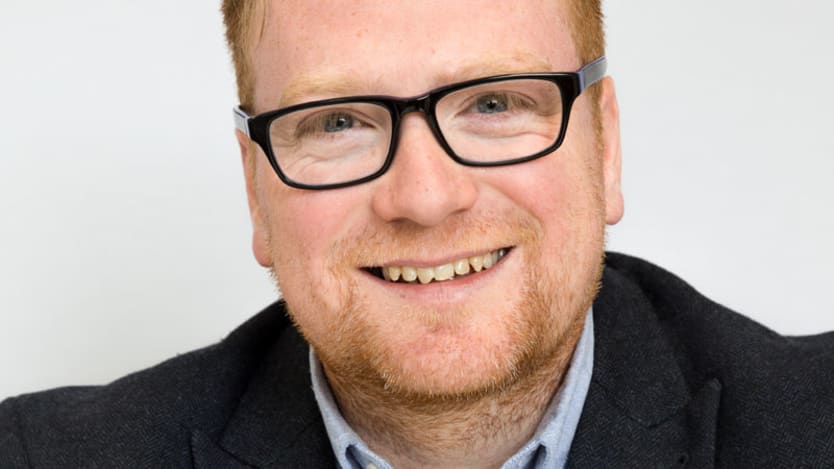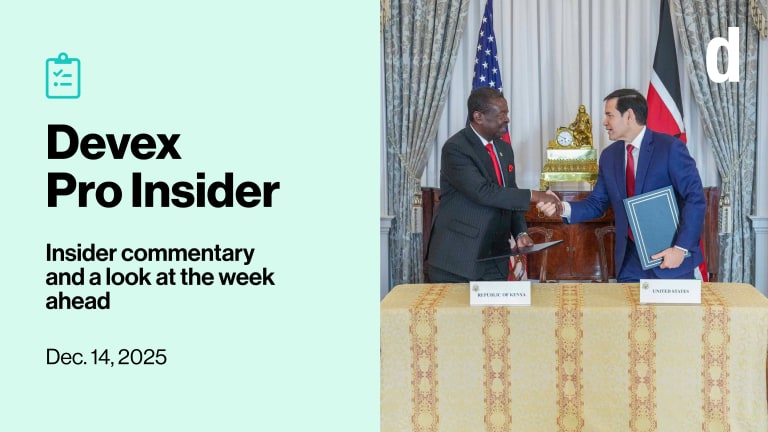Q&A: A 'twin-track' approach to disability-inclusive disaster preparedness

BANGKOK — Small environmental hazards can quickly become disasters for people with disabilities, yet these individuals are far more likely to be excluded from long-term disaster planning and response, according to Fred Smith, head of policy for international charity Sightsavers.
Devex’s Development Enabled series:
Development Enabled explores the daily challenges of people with disabilities, while looking at solutions on how to support a disability-inclusive world.
Smith, who recently helped advise the U.K. Department for International Development on its first disability inclusion strategy, said there are still too few examples of inclusive integrated approaches to disaster risk management on the ground.
Officials who design evacuation plans or early warning systems may not consult with members of the community living with disabilities, many of whom are already facing poverty, discrimination, and violence in low- and middle-income country contexts. Shelters and relief also tend to be located near community centers where accessibility hasn't been considered, Smith said. As a result, people with disabilities may not be able or want to seek safety in a shelter.
“Even in their homes, they don't feel safe if other areas have been hit by disasters because people then come into their communities, and they feel again unsafe and more likely to experience discrimination.”
Effective programming for Inclusion, particularly in disaster risk reduction efforts, requires more robust data collection and use, and the active involvement of people with disabilities, Smith said.
“The ideal is that all mainstream interventions consider inclusion. I think we're beginning to make progress, but that's where the policy now really needs to drive changes in practice.”
— Fred Smith, head of policy, SightsaversIn the broader sense, development actors should be thinking about long-term, inclusive resilience building; humanitarian actors should consider inclusion within a short-term response; and the climate change community should think about how the resilience of people with disabilities to climate risk can be built up over time, he added.
“What really is required is long-term interventions that build the resilience of people with disabilities and other groups who are likely to be contextually marginalized to better cope with the impacts of disasters, but also every-day development challenges,” Smith told Devex.
Devex caught up with Smith to find out what kind of interventions are working, and what recent policy progress means for the future of inclusion.
The conversation has been edited for length and clarity.
What sort of progress has there been around ensuring participation of people with disabilities in disaster management planning?
What has been encouraging recently is more and more international NGOs are adapting their participatory vulnerability assessments to make sure that they're actually engaging people with disabilities.
In Bangladesh, we had a disability inclusive disaster preparedness program that fostered self-help groups and disabled people's organizations so they could access more information on disaster planning, but it also linked them to existing local social welfare support and employment training. And what we found is that as they became more confident to advocate for their rights, they ended up lobbying the local disaster planning committees and through that, were invited to become members.
That is critical — because then people with disabilities were informing the long-term planning for disasters in their communities.
Is there a recent example of an intervention that stands out to you when it comes to an inclusive approach to disaster risk reduction?
What's really encouraging is that there's been a lot of progress in this area quite recently. In terms of programmatic interventions, we were involved in some research last year on disability and climate resilience. What good practice tends to do is mainstream inclusion but also provide targeted interventions where required. We refer to that as “twin-track” interventions.
They tend to be quite effective and there's been some good work from NGOs around households particularly affected by the Sahel food crisis, so ensuring that all households are getting what they need, but then considering households with people with disabilities within that — what we call twin track.
It sounds like the twin-track intervention model is becoming a more common way to approach inclusivity?
More from the Development Enabled series:
► DFID launches its first disability inclusion strategy
► From CSR into HR: Disability inclusion in the workplace
► Supporting disability advocacy: Insights from Savina Nongebatu
Where NGOs have done it well, it's just thinking about disability within their broader work.
I know there's been work with a lot of central Asian countries, for example, around national curriculum and developing curriculum that train children in disaster response, child rights ... What Save the Children did for example is adapted that training to ensure that they were reaching children with disabilities as well.
That's an example of thinking “what are we working on with the whole community around inclusion and DRR, and how do we make sure children with disabilities are taking part as well?”
And that's what you'd like to see more of?
Yeah. I don't think we're there yet, the sector isn't there yet, but that's why this is so important. The ideal is that all mainstream interventions consider inclusion. I think we're beginning to make progress, but that's where the policy now really needs to drive changes in practice.
Speaking of policy — you worked with DFID's policy team to help them create part of the new disability inclusion strategy that was launched in December 2018. How was that process, and what does the strategy signal to you in terms of progress?
There's been real policy progress. On DFID’s strategy itself, it's another step forward for the U.K. They've had their disability frameworks in 2014 and 2015, and now having a strategy is real progress.
It's encouraging that humanitarian action is one of the four strategic pillars [of DFID’s disability inclusion strategy] and that within that there are some quite specific things that DFID have said they're going to do. For example, they recognize the importance of better data because that is required for more effective and inclusive humanitarian assistance. They also talk broadly around access, mental health, and psychosocial support … so that’s all very encouraging, but obviously we want to see that move into action.
I think the thing that I'm particularly interested in is DFID is talking about how they're going to ask their partners to do more and that they're going to adhere to all these guidelines that have been developed.
For more coverage on creating a disability-inclusive world, visit the Development Enabled series here.

Search for articles
Most Read
- 1
- 2
- 3
- 4
- 5








